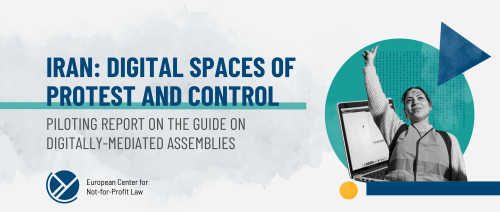Iran: Digital spaces of protest and control
European Center for Not-for-Profit law new report "Iran: Digital Spaces of Protest and Control" describes the impact of Iran's digital governance and censorship on digital assemblies.
Iran has always been exemplified as one of the world’s most closed systems of internet governance.
The Iranian regime uses various technologies, interception methods and oppressive measures to control cyberspace. Access to the internet has been restricted to specific groups or had controlled features from its arrival in Iran. All internet service providers are placed under state control, and all Iranian websites are required to register at the Ministry of Culture and Islamic Guidance.
In addition to this, the state set up a state-controlled network that acts as a passageway to the global internet.
In the new report, Prof. Azadeh Akbari describes the effects of such a restrictive online space on digital assemblies, specifically focusing on the recent protests that took place in response to Mahsa Jina Amini’s death.

"The report shows that Iranian women have been exemplary proponents of how resistance functions within hybrid physical-virtual spaces. As the Iranian regime tightened its grip on internet freedom, feminist activists seized the possibilities that digital technologies provide to advocate for women's rights. The current protests should be viewed in this longer ongoing movement of Iranian women using digital tools to protest and advocate online."
The report illustrates how digitally-mediated assemblies can be controlled, surveilled, or banned in an environment of censorship, for example through abusing content moderation, VPN blocking and detention of journalists.
To describe the specific characteristics and challenges of the current protests in Iran under the motto “woman, life, freedom“, the author uses the Guide on digitally-mediated assemblies and how to monitor them.
The article was first published by European Center for Not-for-Profit Law here.
Contribution by: EDRi affiliate, European Center for Not-for-Profit Law

